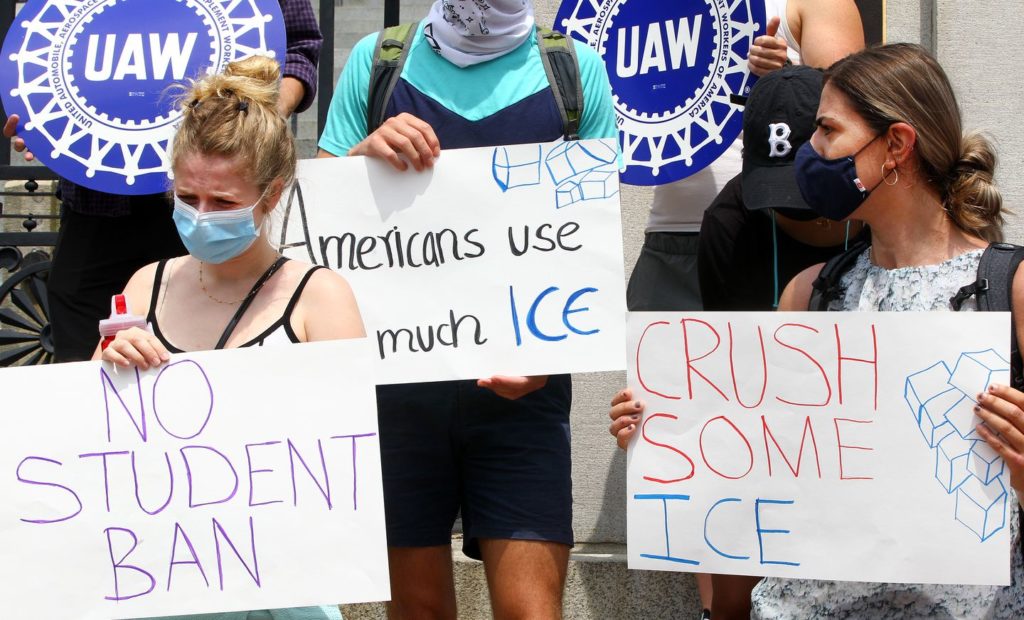
By Ellyn Fritz || News Editor
On July 6th, the Department of Homeland Security announced that international students on an F-1 or M-1 visa could not remain in the United States if their full course load is online. Therefore, such students would have to depart the country or transfer to a school with in-person instruction, as the department will not issue new visas. The failure to do so will lead to removal proceedings. For context, there are more than one million international students in the United States. This July 6th announcement is a rollback of the exemption the government granted in March allowing international students to remain in the United States even if their universities transitioned to an all-online format.
ICE (Immigration and Customs Enforcement) manages international students through the Student and Exchange Visitor Program (SEVP) and SEVP overseas students and dependents in the F (academic) and M (vocational) visa categories. F-1 visas are for the student, F-2 for their dependents, and F-3 for Canadian or Mexican commuter students. The M visas are similarly categorized. To keep their status, F-1 and M-1 visa holders typically have to be pursuing a full course of study.
Under normal circumstances, an F-1 visa student cannot count more than one class (or three-credit equivalent) of online instruction per term toward their full course of study requirement. Students on M-1 visas cannot count any online classes toward their course of study. However, due to the impacts of the novel coronavirus on educational institutions, Homeland Security allowed international students to temporarily count online classes toward a full course of study in excess of the regulatory limits.
In the July 6th announcement, the department decided to limit the exemptions for online learning, triggering lawsuits firstly from Harvard and MIT and later from various institutions, states, and students. Harvard and MIT claimed the ICE decision was a calculated move to force universities to reopen their campuses and hold classes in person despite the soaring toll of coronavirus cases and deaths, violating the Administrative Procedure Act, which governs how federal agencies make rules. In addition, the complaint alleged that the policy left thousands of international students with no real option for education in the United States just weeks before the start of the fall semester, meaning students who must return to their home countries would encounter severe obstacles in continuing their education, such as different time zones or difficult home lives.
For F&M’s international students, who comprise 13.3 percent of the student body, the initial announcement from Homeland Security was not a threat due to the college’s July 1 announcement that students would return for residential learning. In a statement to FOX43 News on July 7th, Sue Mennicke, F&M’s associate dean for International Programs, stated, “Franklin & Marshall College, like all colleges and universities in the US, is in the process of fully comprehending the scope of the recent ruling regarding online learning and international students. Since the College has decided to operate “in-person” instruction, F&M’s international students in the US are not currently under threat of being forced to leave the country. We continue to collaborate with other professionals in the field and consult expert resources as we work to keep our students, faculty, and staff fully informed about the ramifications of this ruling.”
On July 10th, Franklin & Marshall was one of the 180 institutions of higher education who joined in litigation opposing the international student ban. The Presidents’ Alliance on Higher Education and Immigration led the various institutions to file an Amicus brief in federal court litigation in support of rescinding the guidance ordered by the Administration on July 6th .
On Tuesday, July 14th, the abrupt reversal of the Trump administration’s plan to require international college students to leave the United States unless they are enrolled in at least one face-to-face class was disclosed in a federal Boston court. The judge said the agreement reverted policy to “the status quo” that had been developed in March.
Despite this recent reprieve, unfortunately, international students still face a series of challenges in order to return to the U.S. such as travel restrictions, limited flights, and closed U.S. consulate offices. U.S. consulate offices, where students go for an in-person interview to obtain their visas, are currently closed. According to a projection from the National Foundation for American Policy, enrollment for new international students is projected to decline to 63% from last year’s 98%. Under the worst circumstances, the number of new international students would be the lowest since World War II. Students will soon know, though, whether an in-person fall is a fallacy only for those living abroad or for domestic students, too.
Junior Ellyn Fritz is the News Editor. Her email is efritz@fandm.edu.